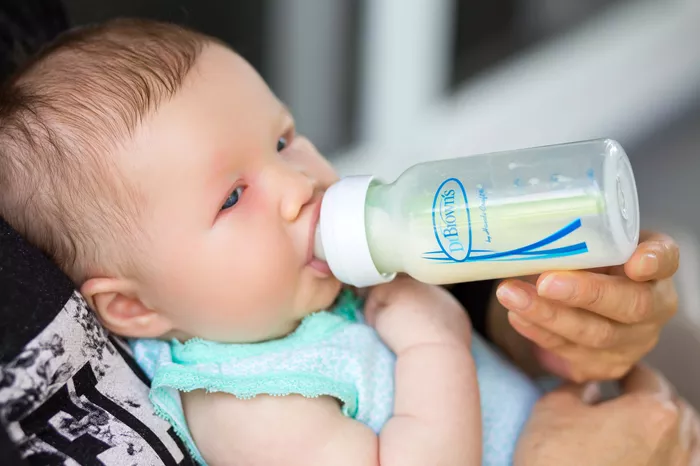Feeding a newborn can be both exciting and challenging. At two weeks old, your baby’s needs are growing, and understanding how much formula they should be drinking is crucial for their health and development. This guide will help you determine the right amount of formula for your two-week-old baby, ensuring they are getting the nourishment they need.
Understanding Newborn Feeding Needs
At two weeks old, your baby is still adjusting to life outside the womb. Their digestive system is maturing, and they are growing rapidly. Proper feeding is essential for their growth, energy, and overall well-being.
How Much Formula Should a Two-Week-Old Drink?
Generally, a two-week-old baby needs about 1.5 to 3 ounces (45 to 90 milliliters) of formula per feeding. They usually need to be fed every 2 to 4 hours. The exact amount can vary based on your baby’s appetite, weight, and overall health.
Feeding Frequency
At this age, your baby will likely need to eat about 8 to 12 times a day. This frequent feeding schedule is normal and helps support their rapid growth. If your baby is feeding less often or seems hungry more frequently, it might be worth discussing with your pediatrician to ensure they are getting enough nourishment.
Recognizing Hunger Cues
Understanding your baby’s hunger cues can help you determine if they need more or less formula. Common hunger cues include:
Rooting Reflex: Your baby may turn their head toward your breast or bottle.
Sucking Movements: They might make sucking motions or try to suck on their hands.
Fussing or Crying: Crying can be a late sign of hunger, so try to respond to earlier cues.
Adjusting Formula Amounts
As your baby grows, their formula needs will increase. At two weeks old, you might start with the lower end of the recommended range and adjust based on your baby’s appetite and growth.
Signs Your Baby is Getting Enough Formula
It’s important to ensure your baby is getting enough formula. Signs that your baby is well-fed include:
Steady Weight Gain: Your baby should be gaining weight consistently. Regular check-ups with your pediatrician will monitor this.
Regular Wet and Dirty Diapers: A well-fed baby will have 6 to 8 wet diapers and 2 to 5 dirty diapers per day.
Content Between Feedings: Your baby should seem content and satisfied after feedings and not cry excessively for more food.
Common Formula Feeding Concerns
Here are some common issues parents face with formula feeding and how to address them:
1. Overfeeding
If your baby is drinking more than the recommended amount and seems uncomfortable or is spitting up frequently, they might be overfed. Try to stick to the recommended amounts and adjust based on their hunger cues.
2. Underfeeding
If your baby seems hungry shortly after feeding, they might need a bit more formula. Ensure you are offering the right amount and monitor their growth and diaper output to check if they are getting enough.
3. Spitting Up
Spitting up is common in newborns. If your baby is spitting up frequently, it might be helpful to feed them smaller amounts more frequently and ensure they are burped properly during and after feedings.
4. Formula Preferences
Some babies might have sensitivities to certain formulas. If you notice signs of discomfort, such as gas or constipation, discuss changing formulas with your pediatrician. They can recommend an appropriate alternative.
Creating a Feeding Routine
Establishing a feeding routine can help you and your baby manage feedings better. Here are some tips for creating a routine:
1. Keep a Feeding Schedule
Try to feed your baby at regular intervals. This helps ensure they are getting enough formula and can help establish a routine for both of you.
2. Monitor Growth and Development
Regular check-ups with your pediatrician will help monitor your baby’s growth and ensure they are getting the right amount of formula.
3. Be Flexible
Every baby is different. Some days your baby might need more or less formula than usual. Be flexible and adjust based on your baby’s needs and cues.
Consulting Your Pediatrician
Always consult your pediatrician if you have concerns about your baby’s feeding. They can provide personalized advice based on your baby’s health, growth, and nutritional needs. If you notice any significant changes in your baby’s feeding patterns, weight gain, or overall health, seek their advice.
See also: When Do Newborns See Properly
Conclusion
Understanding how much formula your two-week-old baby should be drinking is crucial for their growth and development. At this age, they typically need about 1.5 to 3 ounces of formula per feeding, every 2 to 4 hours. Monitor your baby’s hunger cues, weight gain, and diaper output to ensure they are getting enough nourishment. Adjust the formula amount as needed, and consult your pediatrician with any concerns. By providing the right amount of formula and maintaining a feeding routine, you can help support your baby’s health and well-being during these early weeks.


